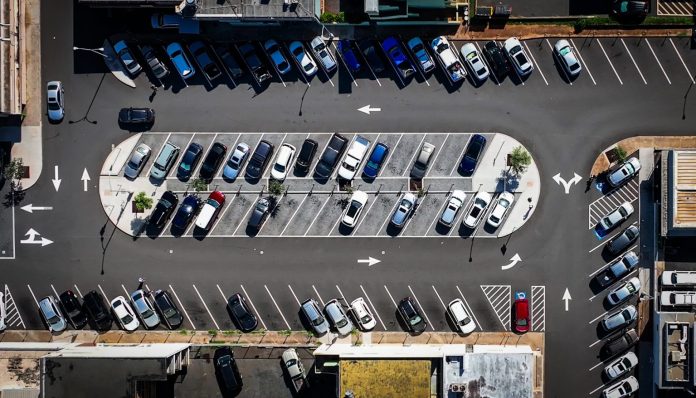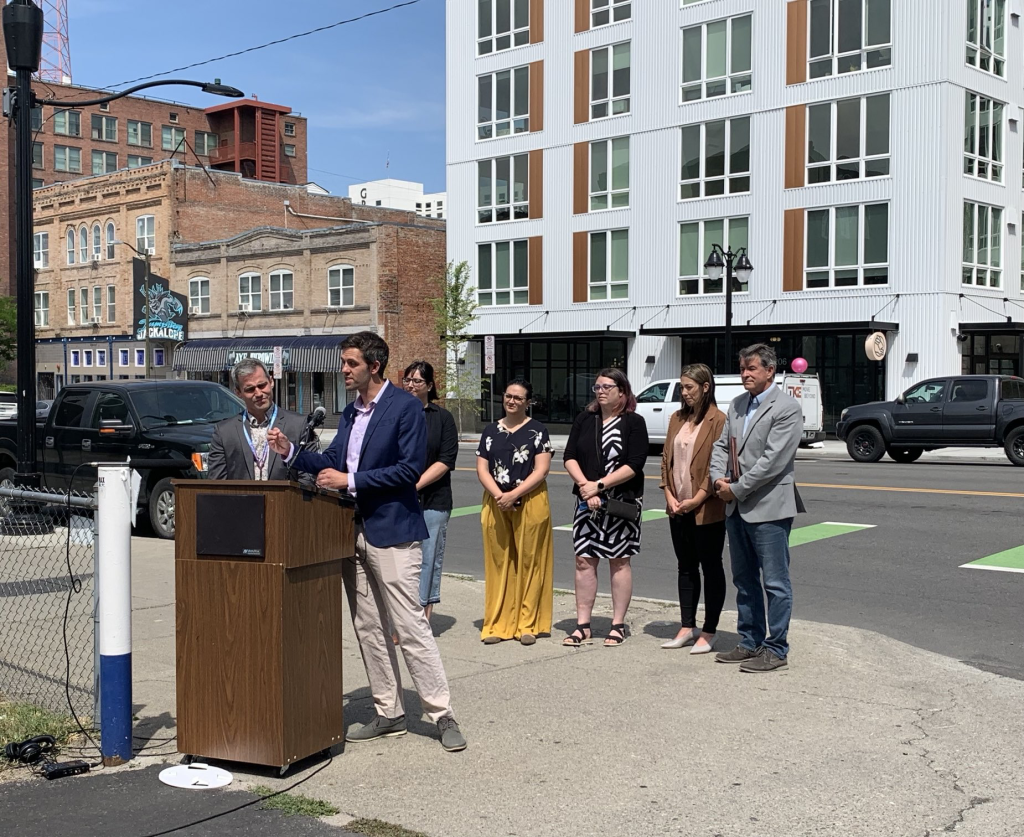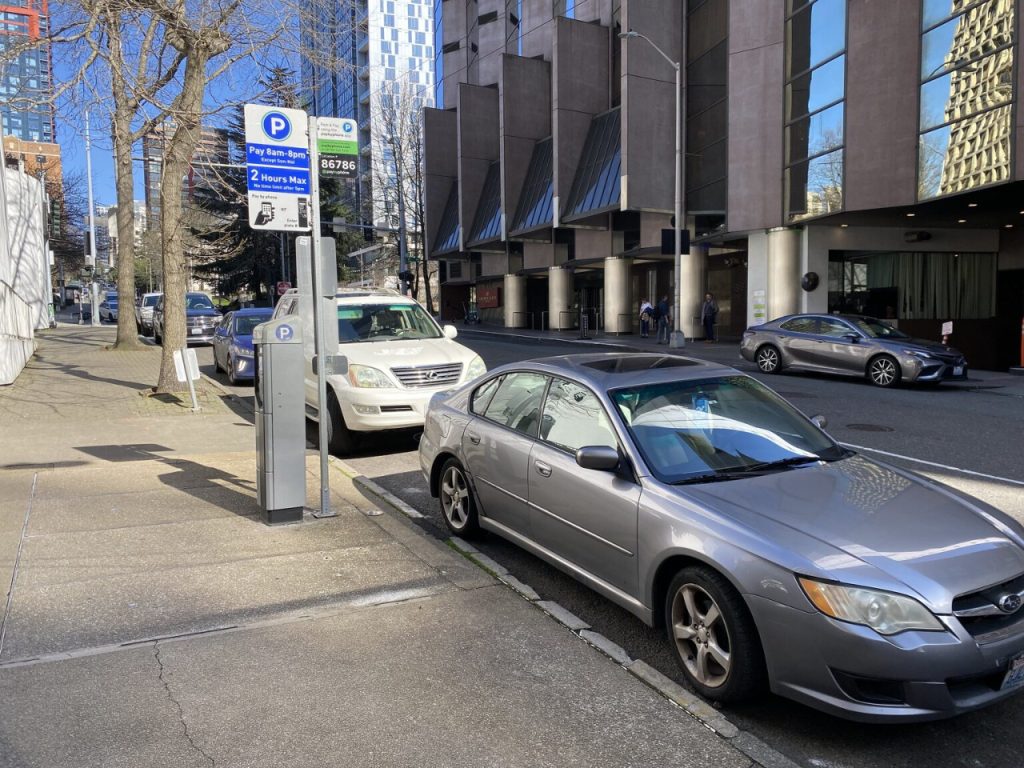
Spokane became the largest city in Washington State to eliminate citywide parking mandates requiring builders to add off-street parking stalls in new developments, after a 4-1 vote of the Spokane City Council Monday night. With the express intention of reducing housing costs while encouraging the city to become more multimodal, the significant step puts the city out ahead of most of Washington state — though other major American cities including Austin, Portland, San Jose, and Minneapolis have fully ditched their parking mandates in recent years.
Spokane had already taken the step of eliminating mandated parking within a half-mile of any transit stop in the city last year, a move which had already allowed builders to match parking with demand — rather than an arbitrary benchmark — across most of Spokane. That followed similar reforms in Seattle, initiated in 2012 and expanded upon in 2018, that made parking optional in areas close to frequent transit and for affordable housing. However, Spokane is the first major city to take the final step of ditching minimum parking requirements altogether, acknowledging the degree to which having them in place is counterproductive to several city goals.
“We’re hearing from the community, a lot of interest for a more dynamic city, and really a growth of a city,” Spokane Councilmember Zack Zappone told The Urbanist. “And that involves multimodal transportation, being able to take the bus around the city or bike — and we’re making investments in our bike infrastructure too — or walk around the city, and less of a reliance on vehicles. And a lot of our development and growth came after World War II, and so there’s a lot of reliance on cars in our city, and so we’re looking at how can we transition and grow as a city.”

“We know that the underlying code doesn’t change anything overnight, but it’s really 10, 20, 30 years down the road. And a lot of our current existing city infrastructure has an overabundance of parking,” Zappone said.
But despite ambitious climate plans that are pushing cities to move to orient their transportation systems toward walking, biking, and transit, paired with an obvious need to reduce the cost of housing wherever they can, Washington cities have not been anxious to ditch their arbitrary parking requirements. Only the City of Port Townsend (population 10,500) has taken the step of striking parking mandates from its code entirely. Meanwhile, even the cities within Puget Sound’s urban core that have wholeheartedly embraced transit-oriented development have been wary of taking the final step.
Catie Gould has heard all of the arguments in favor of keeping parking minimums. She’s a researcher at the Sightline Institute, specializing in parking policy. Sightline has been assembling data for years in favor of ditching minimum parking requirements, including the promotion of study that looked at what happened after Seattle eliminated them near transit in 2012: 59% of the new homes built in the city between 2012 and 2017 would have been illegal to build under previous requirements. That number translates to 18,000 fewer parking spaces and $537 million in housing costs saved, according to Sightline estimates.
In Buffalo, New York, which has a less robust transit network than Seattle, the percentage of new homes that were built with less parking than previously required after the implementation of reforms was even higher, at 68%.
“It’s good to have different types of buildings, and different options for people,” Gould told The Urbanist in late July in advance of the Spokane Council taking up the issue. “When you’re personally looking for a place to live, if off-street parking is really important to you, maybe you have a large family, you own multiple cars, whatever makes parking important to you, there will be housing available for you, and you can pick that. But that’s not the case for everybody.”
Gould thinks the fact that the parking conversation in Washington state has focused around transit might actually be holding policymakers back; conversations in other places have instead focused on property rights and reducing housing costs. Tenants who don’t own cars or use building parking still pay parking costs, Sightline research has shown, since landlords rarely charge the full cost of parking to tenants who do procure parking spots. Instead, a large share of parking costs are borne by all tenants in their base rent.
“In some ways, I feel like that’s a simpler conversation to have about just who decides what is the right fit for a given property, instead of trying to break it into this argument about how much people drive, and are people going to stop driving, and can you survive on transit — it’s a hard conversation to get out of once you start having it,” Gould said.

Targeting the policy to focus around transit has had limited success so far. In 2023, Representative Julia Reed (D-36, Seattle) introduced a bill that would have eliminated minimum parking requirements within either a half-mile or a quarter-mile of transit service, depending on the frequency of the service. It was the first bill introduced at the Washington State Legislature to directly target minimum parking requirements head-on, not as an added component of another bill.
“In the Seattle Metro area, almost half of the land within a half-mile of the existing [or] planned rail or bus rapid transit station still requires at least one parking spot for every home, even a studio apartment, and nearly half of that land mandates two parking spaces.” Reed said while introducing her bill last January. “At the end of the day, our state is facing a housing shortage, and not a parking shortage.”
But that bill died without even making it to the House floor in 2023, and did not return in 2024. The fact that it failed to advance can definitely be traced back to advocacy from groups like the Association of Washington Cities or AWC, who have argued that local governments are the best entities to set minimum parking standards. In attacking Reed’s bill, AWC’s lobbyist Carl Schroeder said that the change would “transfer the responsibility of managing the impact of vehicles from elected representatives who are accountable to the public to hodgepodge of uncoordinated developers who don’t have a responsibility to preserve or protect the public interest.”
But many jurisdictions, including ones espousing intentions to become more transit-oriented and walkable, have outsourced their parking standards to the parking generation manual created by the Institute of Transportation Engineers (ITE), widely used across the US. Those standards are often created with incredibly flimsy data, but more importantly reverse cause-and-effect, by trying to anticipate how many trips will be generated by the very infrastructure that cities then prescribe, encouraging more driving.
In the real world, repealing minimum parking requirements has been shown to create opportunities that did not exist before. Sightline’s analysis of parking reform in the Portland suburbs are poised to make around 37,000 homes less expensive to develop, 20% of the region-wide target for the coming years in service of the goal of broader housing affordability.
“What’s tough in the state legislature is, a lot of this cities that participate are in opposition, and cities who are kind of supportive or maybe more quiet, are places that are actually doing those reforms,” Gould said. “So that’s a little bit of a bias of who shows up and who gets heard.”
Many Washingtonians may look south of the border, at the 14 cities (and counting) that have completely ditched minimum parking requirements in Oregon. But it wouldn’t be as simple as following in that state’s footsteps. It wasn’t a bill from the Oregon legislature that prompted cities to repeal their mandates — instead it was an obscure rulemaking body within the administration of Governor Kate Brown, who issued an order in 2020 directing state agencies to take steps to reduce greenhouse gas emissions. In 2022, Oregon’s Land Conservation and Development Commission voted to adopt rules that require most of the state’s urban jurisdictions to either ditch their mandates or jump through a bunch of hoops to keep them on the books.
Most Oregon cities so far have chosen the easier path, but Washington doesn’t have a similar rulemaking body. Here, reform is more likely to happen at the legislature or at the local level.
Nonetheless, Zappone is pushing Spokane to lead the way when it comes to reforms that create more vibrant, affordable communities, and he thinks that the tide is turning in the right direction.
“It is shocking to me how much resistance there is across the state,” Zappone said. “We see this trend nationally occurring with over 70 cities eliminating parking minimum requirements. And so I think the trend is growing across the country, and it’s only a matter of time until Washington state starts implementing these changes.”
Ryan Packer has been writing for The Urbanist since 2015, and currently reports full-time as Contributing Editor. Their beats are transportation, land use, public space, traffic safety, and obscure community meetings. Packer has also reported for other regional outlets including BikePortland, Seattle Met, and PubliCola. They live in the Capitol Hill neighborhood of Seattle.

